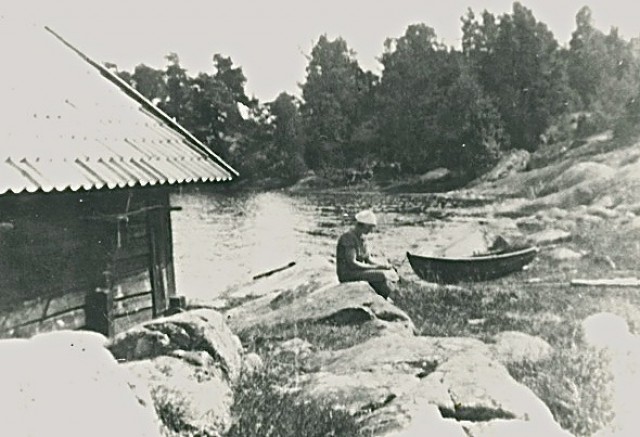Doris story

“My name is Doris and I grew up at Ramsviken. I was born in 1929 in the house where we lived, at a time when most children were born at home. I had an older sister and older brother, and both of them, like me, were born at home. Dad had to walk a long way to phone for the midwife when it was time for me to be born, since the nearest telephone was on a farm a long way away.

My father was a carpenter and fisherman. Mum looked after the animals and us children, while during the summers she cleaned and did the laundry for the summer visitors to the islands. Our house had a single room and a kitchen, where there was a wood-burning stove. We had an outdoor privy, and a cellar where we kept food and supplies. There were no refrigerators or freezers at that time, and we had an icehouse with sawdust, where we kept milk and other fresh foods in the summer.

Mum grew a lot of vegetables such as potatoes, carrots and peas. She preserved them in a special machine so that they kept throughout the winter. We used to pick a lot of berries and mushrooms from the forest.
The barn was a short distance from the house, with the stable, cowhouse and pig sty. We had three cows, a calf and a pig, and the chickens lived in the woodstore, close to our house.

Sometimes we took a cow to Säby Farm, which was more than 5 km away. They had a bull at Säby that was mated with our cow in order to produce a calf for us. When they had been together in the field we had to walk all the way home again with the cow. Cars were seldom seen when I was growing up. We walked, rowed, or took a horse and cart when we wanted to go somewhere. The bus started to come out to us towards the end of the 1920s, but it only ran once in the morning and once in the evening.
We didn’t have a TV or computer. During the winter holidays we went skiing in the forests, or used our kicksleds on the roads. When the lakes had iced over, we could go skating. We also used to slide down the snow on a terribly steep hill.
We didn’t have toboggans, so we used the washbasin, which was made from sheet metal. We got up to incredible speeds on that hill!

We didn’t have a shower or bath, and we washed in a metal hand basin. First, you had to use a bucket to get water from the well, which was a bit from the house. The water was heated on the wood stove. We used wood both for the heating the room and for cooking.

The wood was very important and Dad had to go out into the forest with the horse and chop down trees. The horse dragged the logs home to the woodpile, where they were chopped up and stacked so that the wood would dry. It was nice during the summers, since I could then take the chance to wash in the sea (the Baltic Sea).
Mum did all the washing by hand, since there were no washing machines.
The laundry was placed with water in a large washbasin that was hung over a wood-burning fireplace. Sheets were boiled clean in the basin with soap and lye. She used a smaller basin for our clothes and rubbed them against a washing board to get rid of the dirt. We rinsed the laundry in the lake and hung it up to dry in the wind.
I used to play with my older brother and sister during the winters. But we didn’t have as much time for playing as children have nowadays. We went to school on Saturdays, as well as the other days of the week.

We had other children to play with only during the summers, when the summer visitors moved out into the archipelago. But then we played all the time with their children. We cycled and rowed between the jetties, and went swimming. Sometimes we went down to the lake and watched Dad bringing in eels that he had caught. When it rained we sat indoors and read books, and sometimes I did jigsaw puzzles, the same ones over and over again.
We helped Mum in the kitchen sometimes. We cleaned the dishes with soap, since we didn’t have washing up liquid as today. There was no waste-water drain, so we used a waste bucket that we emptied onto the rubbish heap. There we also threw away waste that could become soil again, so that Mum could grow her vegetables. The stems from potatoes and carrots were thrown onto the heap, and we gave the potato peel to the pig.

Nobody came to collect the rubbish in those days. A lot of it we chucked straight into the sea, and the bay could become full of rubbish. Dad took us out in the boat and we sank bags with metal cans and stones, together with other waste that couldn’t become soil again.
We had fun growing up in the archipelago: it was like living in our own world. I can’t remember ever travelling in to Stockholm when I was a child. But Dad often travelled in to Gustavsberg on Värmdö to sell the fish he had caught. There was a lot of herring out here at that time, together with pike.
I used to go with Dad to Gustavsberg sometimes, and he bought me boiled sweets in a paper cone. This was really exciting, since we nearly never ate sweets in those days.”
